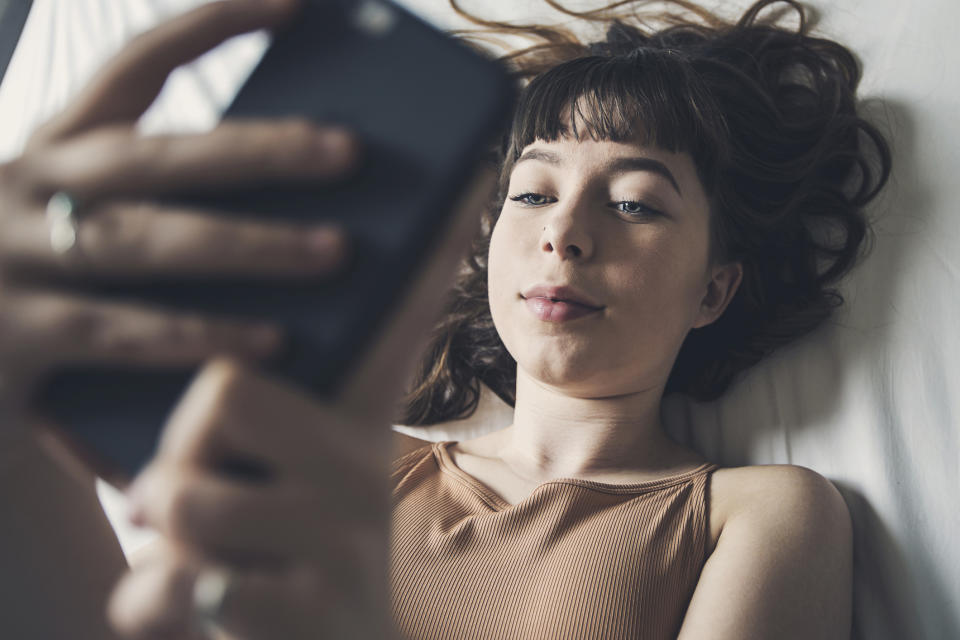When parents should worry about teen girls selfie-taking

Parents may well be concerned about the impact selfie-taking could be having on their teenager’s self-esteem.
But a recent study has revealed that the taking and sharing of selfies on social media is not actually linked to poor body image.
However, the research, which analysed the selfie-taking behaviours of teenage girls, did reveal the point at which selfies could cause parental concern.
It turns out the red flags to watch out for are when adolescent girls spend too much time agonising about which photo of themselves to post or become overly reliant on photo editing apps to alter their snapshots.
The study, by researchers at the University of Arizona, analysed the selfie behaviour of 278 teenage girls aged 14 to 17, with participants being quizzed on how often they share selfies and their use of photo-editing techniques for example to smooth skin or appear slimmer.
Read more: Social media users 'copy' friends eating habits

The online survey also encouraged the teens to respond to a series of statements to analyse ‘selfie investment’, which researchers explain refers to how much time and effort they spend choosing which selfies to share on their social media platforms.
Findings, published in the Journal of Children and Media, revealed that selfie editing and selfie investment were related to self-objectification, which led to body shame, appearance anxiety and more negative appearance evaluations in teenage girls.
“Self-objectification is the idea that you come to think of yourself as an external object to be viewed by other people,” says senior study author Jennifer Stevens Aubrey, an associate professor of communication in the University of Arizona College of Social and Behavioural Sciences, according to EurekAlert!.
“Your orientation to the world is not an internal one, where you're thinking about how you feel or what you know or what you can do, but rather what you look like to other people. The focus on taking the perfect selfie seems to be encouraging girls to learn to see themselves as external objects for people to look at and admire.”
And self-objectification can lead to some pretty negative outcomes.
“Self-objectification is the pathway to so many things in adolescence that we want to prevent," Aubrey adds.
“So, interventions really should focus on how we can encourage girls to develop an awareness of themselves that's not solely hinged on what they look like to other people.”
The researchers say the problem is not the taking of selfies themselves, but getting too invested in curating the images to ensure they are social media-ready.
“Our main finding was that we really shouldn't be too worried about kids who take selfies and share them; that's not where the negative effects come from. It's the investment and the editing that yielded negative effects,” Aubrey said.
“Selfie editing and selfie investment predicted self-objectification, and girls who self-objectify were more likely to feel shameful about their bodies or anxious about their appearance.”
Read more: People are photoshopping their knuckles for perfect manicure snap

The study authors recommend parents keep their eye out for certain potential warning signs that children are becoming too selfie-invested, such as photo editing apps or camera rolls flooded with selfies.
If parents are concerned, researchers suggest opening up a dialogue about their teen’s selfie-behaviour and encouraging them to focus on other reasons for sharing a selfie, such as charting a new travel experience.
“Having those conversations at a very early age is one of the ways problems can be avoided in the future,” advises another of the study author’s, Larissa Teran.
“Selfies aren't bad. Just don't obsess,” she adds.
Read more: Couples feeling pressured to have Instagram-worthy weddings
The research comes as it was revealed last month that selfies showcasing slim, toned bodies on social-media are having a “negative impact” on nearly two-thirds of women.
A survey of 1,962 women by the public body Sport England reveals 63% have been left feeling self-conscious after seeing the “perfect figure” online.
Having an impact on self-esteem isn’t the only concern for selfie-taking fans.
Recent research revealed selfies are fuelling a rise in the number of young people complaining of sore wrists.
The action of taking a picture of yourself using a smartphone, risks the development of a painful nerve condition, a doctor told The Sunday Times.
An increase in what has been branded “selfie wrist” corresponds with a growing obsession for people to share images of themselves on social media.



